For the first survey of 2023 and onwards, Chiltern & South Bucks Policing Issues Forum made some changes to the choices offered in our neighbourhood surveys.
Responding to residents’ feedback, we made the link between what residents tell us, the resulting choices of Neighbourhood Policing focus areas, and outcomes as measured by published crime stats, easier to explain and monitor. This means streamlining the survey choices. This should also remove some confusion over choices which are predominantly the responsibility of other agencies.
CSB Forum Survey Choices
(Click Categories to expand for further information.)
Antisocial Behaviour
Anti-social behaviour (ASB) is defined as someone acting in a manner that causes or is likely to cause harassment, alarm or distress to one or more people not living in the same household as the perpetrator.
Antisocial Behaviour is a very broad category, which includes:
- Personal antisocial behaviour – when a person targets a specific individual or group.
- Nuisance antisocial behaviour – when a person causes trouble, annoyance or suffering to a community.
- Environmental antisocial behaviour – when a person’s actions affect the wider environment, such as public spaces or buildings.
The link below explains in detail the broader definition of Antisocial Behaviour, and looks in detail at various aspects.
Thames Valley Police > Advice and Information > Antisocial Behaviour
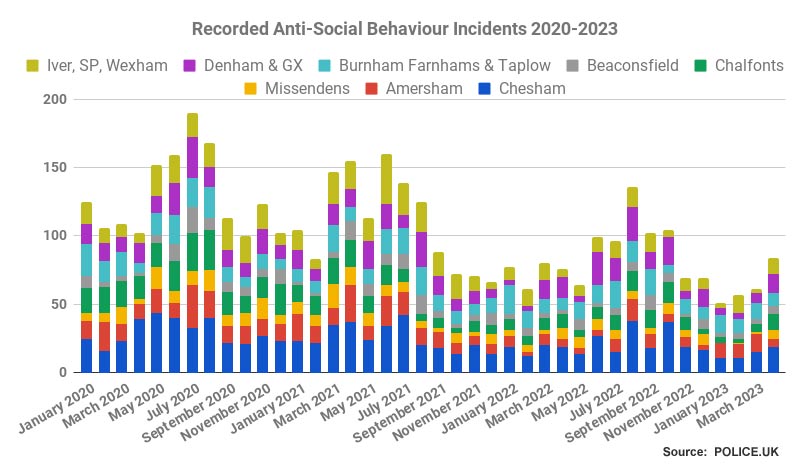
Burglary
Burglary is the theft, or attempted theft, from a premises where access is not authorised. Damage to a premises that appears to have been caused by a person attempting to enter to commit a burglary, is also counted as burglary.
Residential and commercial burglaries are distinguished by the function of the building.
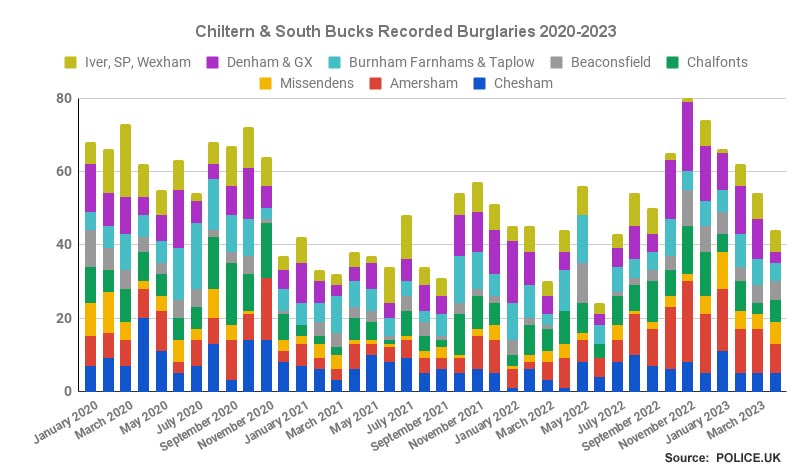
Criminal Damage and Arson
Where property is intentionally destroyed or damaged, not necessarily to gain entry to premises or a vehicle.
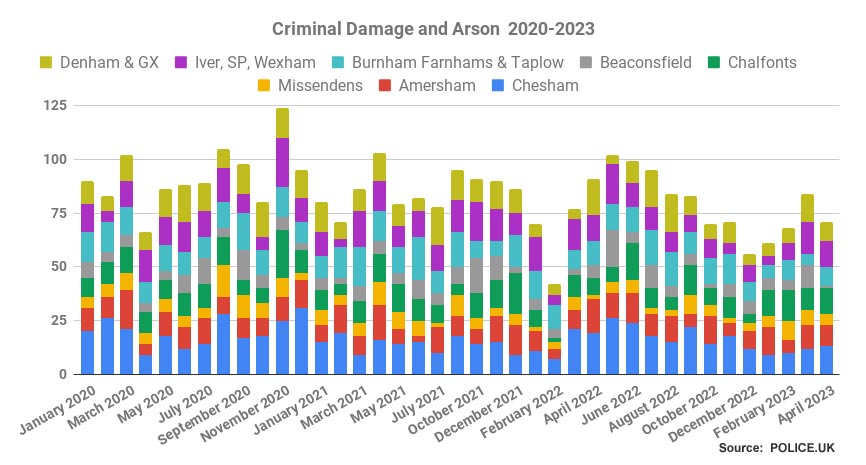
Drugs
Possession, consumption, supply of or the intent to supply illegal drugs.
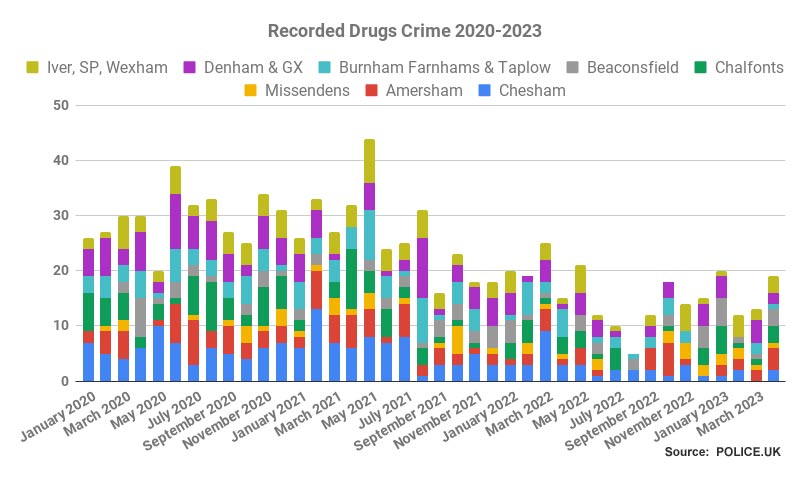
Possession of Weapons
The Forum’s previous list of concerns included a category for Knife Crime. This would have included offences committed with knives, which would be included in Violence against a Person, as well as possession of knives and bladed objects.
POLICE.UK presents statistics on the broader crime category ‘Possession of Weapons’, including illegally held firearms, knives and bladed weapons, knuckle dusters, corrosive liquids and other potential weapons.
We are adopting ‘Possession of Weapons’ in order to fall in line with the POLICE.UK presentation. Thankfully, there is normally a low incidence of such crimes, averaging around 5 per month across Chiltern and South Bucks.
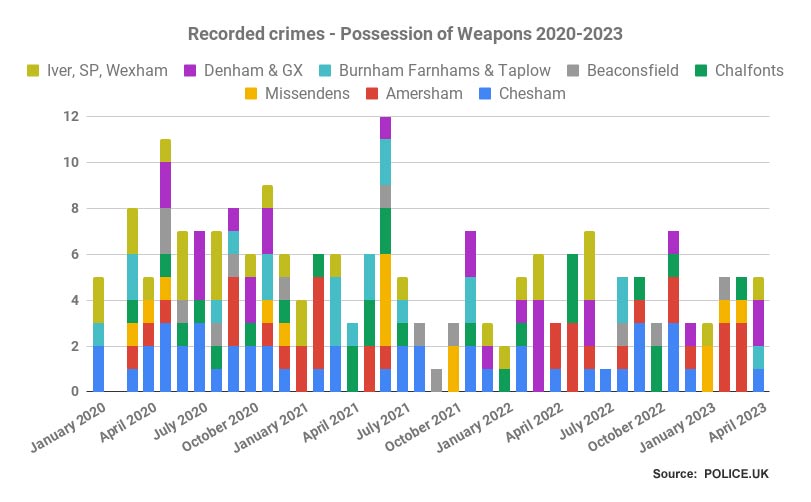
Public Order
The criminal law in respect of Public Order offences is intended to penalise the use of violence and/or intimidation by individuals or groups. Public Order covers a wide range of offences, stretching from drunk and disorderly conduct to riot behaviour. Also included are violent disorder, affray, threatening, abusive or insulting behaviour, acts to stir up racial hatred, or hatred against persons on religious grounds or grounds of sexual orientation.
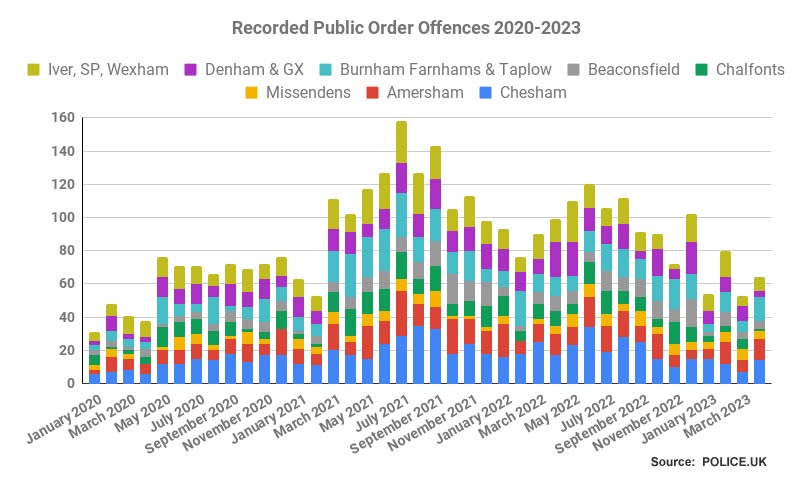
Rogue Traders and Scams
Like Speeding, data is not presented within Police.UK for Rogue Traders and Scams, but the Forum believes that residents should be able to express concerns.
In May 2019, the Chiltern area Forum set Rogue Traders and Scams as one of the three focus areas for Neighbourhood Policing teams.
Activity reported in the following Chesham Neighbourhood Policing report included: “The Neighbourhood Team are frequently engaging with victims or potential victims of Fraud, Scams and rogue trading. Officers will conduct visits and complete assessments to identify vulnerable people as part of Operation Signature and where appropriate, make referrals to safeguard that victim. .
We continue to provide education for carers and potentials victims to raise awareness of types of fraud working in partnership with the community safety team and NatWest.
We also support the Banking protocol. This protocol is in place to protect the vulnerable from rogue traders or scammers who in the past have marched people to their bank to be paid or deceived them into withdrawing large amounts of cash.”
Locally, Buckinghamshire and Surrey Trading Standards is a key player in works to advise and educate residents on matters of fraud prevention, in conjunction with Buckinghamshire Council’s Community Safety team.
Speeding
Statistics for Speeding are not reported on POLICE.UK, and TVP Roads Policing has the primary responsibility for policing speeding. However, our surveys leave us in no doubt that this is a major concern of residents. Neighbourhood Police have responded to Speeding being placed in the top 3 neighbourhood focus areas by holding regular enforcement exercises. It is therefore entirely relevant as a category for inclusion in our surveys.
TVP Roads Policing’s resources are largely focussed on the main arterial routes. Our Neighbourhood Policing teams may respond with targetted speed monitoring exercises within our communities, but will never be able to supply consistent widespread monitoring of all neighbourhoods. Residents can make a massive difference through Community Speedwatch.
Considerable work has been carried out within Thames Valley to make Community Speedwatch a more effective platform. Please see our posts on Speeding and Community Speedwatch and learn how YOU can get involved.
Theft from a Vehicle
Theft of a Vehicle
The Forum’s surveys have offered residents the opportunity to vote under two separate categories: Theft of a Vehicle, and Theft from a Vehicle. POLICE.UK presents statistics under a single category, ‘Vehicle Crime’. Given in particular concerns about catalytic convertor theft, we have decided that it would be useful to continue to maintain the distinction within the surveys.
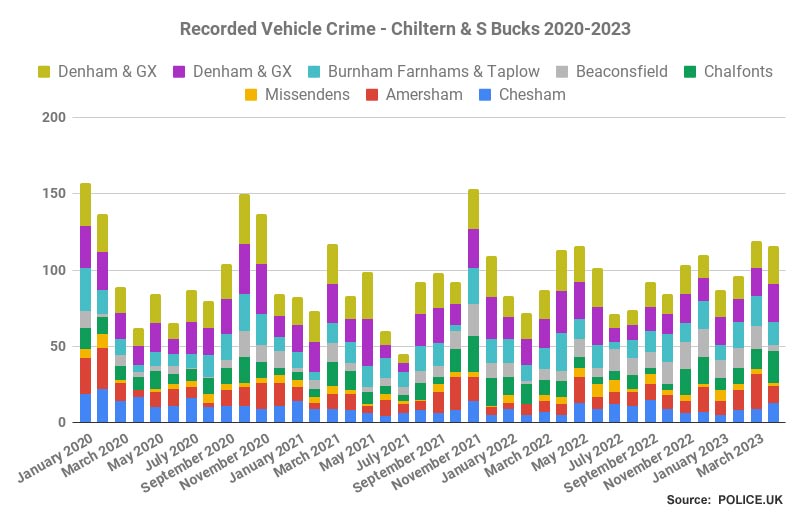
Violence and Sexual Offences
Violence against a Person includes a range of offences from minor offences such as harassment and common assault, to serious offences such as murder, actual bodily harm and grievous bodily harm.
Sexual Offences is a broad category of sexual offences, including Sexual Assault, Indecent Assault, Rape, Unlawful (under age) Sexual Intercourse and Indecent Exposure.
These are aggregated for the purpose of statistical reporting on Police.UK. Because of the breadth of the category, this is by far the largest crime category recorded by Police.UK, routinely accounting for more than a third of recorded crimes in the area.
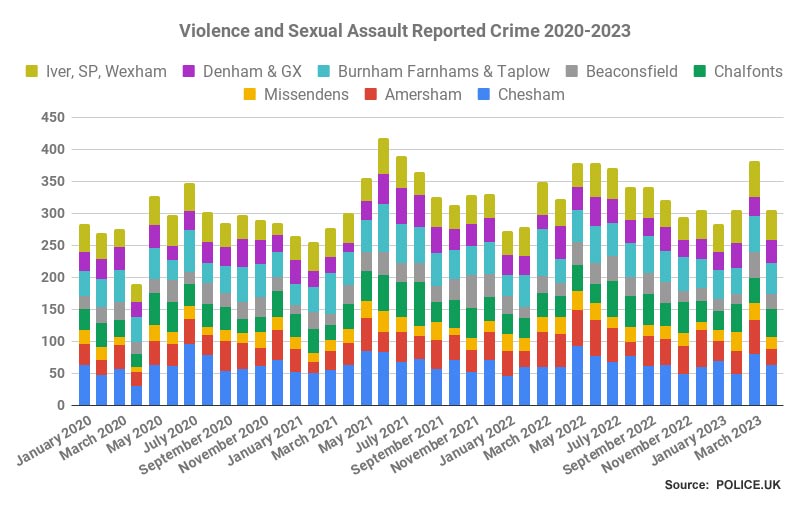
Survey Choices are now more relevant to Neighbourhood Policing
In rejigging the survey choices, we have asked of each category:
- “Would this realistically be a candidate to be included on the Neighbourhood Police officers’ daily work schedules?”
- “Is this category already a national or Force priority?“
- “Is action on this category primarily the responsibility of another body or agency?”
The results should remove the confusion of including categories which are mainly the responsibility of organisations other than the Police. The reason for their previous inclusion is in our history: the Forum was set up 5 years ago at the request of Chiltern District Council’s (CDC) Community Safety team. Generating the focus areas for our Neighbourhood Policing teams was only part of the mandate, however. CDC was seeking also to identify concerns that would be addressed by the Council, either directly or with partner agencies, including Thames Valley Police.
Since 2020 the unitary Buckinghamshire Council’s Community Safety team has preferred to gather data on an all-county basis, with little interest in the work of the Forum. But the Neighbourhood Policing teams within Chiltern and South Bucks continue to see the Forum’s model as an integral part of their engagement with local residents and Community Boards. They are anxious therefore to encourage the Forum to continue its work.
Using Focus Areas within Neighbourhood Policing
Deciding ‘focus areas’ through the Forum’s surveys and meetings enables residents’ concerns to help guide the agenda for the coming 3 to 4 months. Once decided, focus areas are passed to Neighbourhood Police, and these become part of the daily planning and reporting routine for officers and PCSOs.
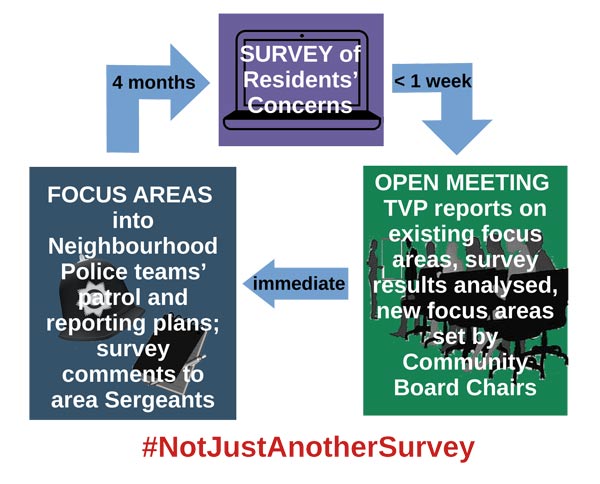
Quarterly reports from each neighbourhood area, all available via links on the www.csb-forum.org website, bring residents up to speed on actions in these focus areas. This is also an integral part of Forum meetings. It is a transparent process, which benefits from as wide a participation of residents as possible.
View latest Neighbourhood Policing newsletters.
For residents wishing to flag concerns via the survey, ‘Other’ and ‘Comments’ boxes will be available. The meetings are open to all residents to raise valid concerns, and TVP will take these forward as appropriate. So reducing the number of categories isn’t meant to deflect concerns or close down discussion. And of course, our officers police crime and harms as they occur, not just those on the list.
Former Survey Choices
What of the categories to be dropped from the surveys? These comprise the following:
Now included in other categories:
- Burglary – Sheds and Garages (included in Burglary category)
- Burglary – Commercial Properties (included in Burglary category)
- Knife Crime (see under ‘Possession of Weapons’)
- Rural Crime – not specifically included within an ongoing category, but various crime types fall within ongoing survey categories – for example thefts within a rural setting. Crimes requiring attention of specialised rural crime officers will be dealt with by the Rural Crime team, though there are close links and cooperation with our Neighbourhood Officers. View posts on Rural Crime team’s work.
Serious crime types led by Police as part of national or Force priorities:
Child Sexual Exploitation and Modern Slavery are two very serious crime types that used to feature in our survey choices.
We shouldn’t underestimate the potential for such crimes taking place within our local community, both behind closed doors and in plain sight. The Strategic Policing Requirement names child sexual abuse as one of its national threats and directs that “Forces should maintain child abuse investigation units and safeguarding teams. These should be staffed by police officers and staff that have undertaken the relevant specialist training to respond to cases of sexual abuse”.
Modern Slavery is an aspect of Serious and Organised Crime, another national threat within the Strategic Policing Requirement (and which also includes child sexual abuse). The everyday lead within Thames Valley is therefore at another level; also, by their nature, these forms of crime are often tackled in a multi-agency manner.
- Child Sexual Exploitation. Thames Valley Police Child Sexual Exploitation web page. Includes description, common patterns, warning signs, how to report and useful links.
- Modern Slavery. Thames Valley Police web page on Modern Slavery. Includes definition, forms of modern slavery, spotting modern slavery, how to report.
Cyber Crime and Fraud is a national and international problem. The UK Parliament’s Justice Committee reported in October 2022 that “the level of focus from policing is inadequate to deal with the scale, complexity and evolving nature of fraud. Only 2% of police funding is dedicated to combatting fraud despite it accounting for 40% of reported crime.” It spelt out the scale of the challenge, and actions needed nationally, including by key stakeholders, particularly telecomms, tech and social media companies. See Justice Committee report.
Tackling Cyber Crime is one of the key National Crime and Policing Measures set by the UK Government. Fighting Cyber Crime and Fraud is also one of the main 5 planks of Thames Valley Police and Crime Commissioner’s Police & Criminal Justice Plan, with the promise: “At a local level, I will continue to be proactive in educating the public and embracing the specialist technology and expertise necessary to pursue cyber criminals. Working through the existing regional structures, developing new collaborations and enhancing the Force’s own capability, we will enhance Thames Valley’s ability to protect the public from cybercrime.” Neighbourhood teams will in any case receive training as part of these initiatives.
Reporting of fraud is through the national platform ActionFraud. But recovery of losses through fraud is notoriously difficult, so the most effective response is always likely to be through prevention and education.
Cyber Bullying was also a category within the previous surveys. The Thames Valley Violence Reduction unit has produced advice sheets aimed at young people, and at parents and carers. Instances can occasion real harm and should be reported. They will be dealt with appropriately.
Thames Valley Police resources also include useful pages of information on Cyber Crime and Fraud. The TVP Cyber and Fraud Twitter account (@TVPCyber_Fraud) offers cyber protection and fraud prevention advice across Thames Valley.
Other agencies working to help residents to keep safe include:
The National Cyber Security Centre (NCSC), offering a range of advice including Information for Individuals and Families.
The National Trading Standards eCrime Team – tackles online consumer scams, rip-offs and fraud, as well as those committed by text or email (https://www.tradingstandardsecrime.org.uk/, https://twitter.com/tsecrime)
Neighbourhood Watch – cybercrime web page and resources
Lead taken by Buckinghamshire Council or other agencies:
Residents may be surprised to see the omission of two categories in particular – Parking and Fly Tipping & Littering. These have regularly featured prominently as concerns in our surveys. This is explained below.
- Parking is a vexatious issue in a number of localities. In many aspects, however, the responsibility is council-led. Please see Buckinghamshire Council’s Parking web page. This is part of the reason we judge it a category that doesn’t qualify for consideration as an area-wide Neighbourhood Policing focus area.
This does not mean, of course, that our Neighbourhood Police won’t involve themselves in their localities, policing instances of Obstruction of the Highway, or illegal/dangerous parking, or in operations to assist in a known hotspot (see for example NHPT support of intervention at The Stoke Poges School surrounding parking concerns, led by Stoke Poges Parish Council). - Fly Tipping and Littering. This is another vexatious issue, especially in the South of the policing area. But the lead for combatting Fly Tpping and Littering lies with Buckinghamshire Council. See web pages ‘Report Fly Tipping‘ and ‘Fly-tipping Enforcement Policy‘.
However, as Buckinghamshire Council’s Fly Tipping team readily acknowledges, there are many examples of cooperation with local Police which have led to effective outcomes. - Drug and Alcohol Abuse – Buckinghamshire Council web page ‘Drug and alcohol abuse‘ gives advice and signposting relating to health and addiction. It also signposts on reporting drug or alcohol related crimes in emergency and non-emergency situations. Drug Crime remains an important ongoing category within our surveys.
- Dog Fouling in public areas is offensive, anti-social and potentially dangerous to human health. It was a choice in the original Forum surveys, but was dropped a while back. The key responsibility in terms of policy and enforcement lies with Buckinghamshire Council. Buckinghamshire Council Environmental Health operates a contracted dog warden service, which patrols parks and open spaces, and any other identified hotspots. They will also investigate complaints of dog fouling and other dog related complaints such as nuisance dog barking.
‘Report Dog Fouling‘ web page on Buckinghamshire Council website.








